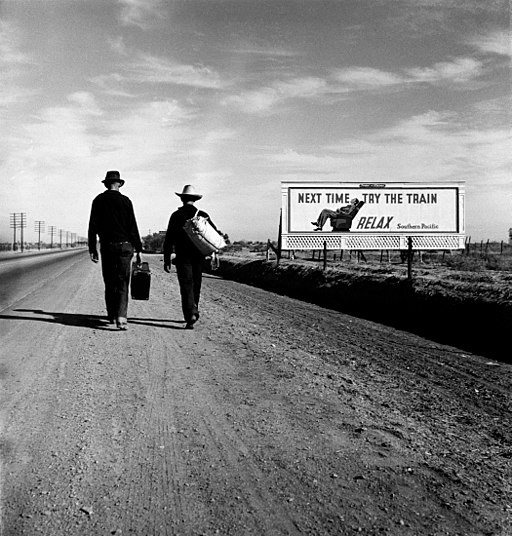Talking Trash
— President Lyndon Johnson to staff member Bill Moyers, on observing racial epithets on signs during a visit to Tennessee.
The terms “white trash” and “rednecks” are probably the only remaining instances where derogatory epithets are more or less acceptable in general society. Privately, of course, people of all stripes can and do use epithets of all kinds to describe others they don’t like, and it often matters little how different are the beliefs they express in public. The reason the labels “white trash” and “rednecks” may still be acceptable has to do with how, now more than ever before, they designate a voluntary lifestyle choice rather than an inborn condition. 100 years ago there was speculation among scientists and others that the condition had a genetic dimension, but since then the argument has been discredited along with the practical applications of eugenics, such as forced sterilization.

A 1937 photo by Dorothea Lange of two men walking toward Los Angeles, California. Ms. Lange took many photographs in her work for the Farm Security Administration (FSA), a New Deal agency.
Near the end of A Face in the Crowd, a 1957 film directed by Elia Kazan, and starring Andy Griffith and Patricia Neal, the public gets a peek behind the mask of the demagogue, “Lonesome” Rhodes. There are many similarities between this film and today’s political and cultural environment, but there is one major difference in the ability of the public to register shock and disapproval for abysmal character flaws in its leaders. Some of the baser elements in today’s society would not only not be shocked by Rhodes’s revealing of his true character, but would approve of his remarks as a middle finger thrust upward on their behalf in defiance of elites.
Just about everyone seems to look down on someone else, to the point that it can be considered a universal human need. Elites are certainly not free from the need to look down on some other group, but in practice they have learned it is in their own interest to be circumspect about expressing their disdain, at least in public. Sneering at the white working class generally without first splitting off the subset of white trash and rednecks is a bad idea that serves to highlight the disconnected and arrogant nature of elites, and it is behavior that will serve to push white working class voters, once the foundation of the Democratic Party along with black working class voters, farther away from Democrats and more securely into the arms of Republicans, where they are given rhetoric they want to hear, but nothing of substance. Listening to people is the first step toward working with them, while loudly condemning them all as racist, misogynist white trash might demonstrate to everyone your purity for the satisfaction of your own smug self-righteousness, but it is hardly the way to win friends and influence people, a vocation otherwise known as politics.
— Vita 


